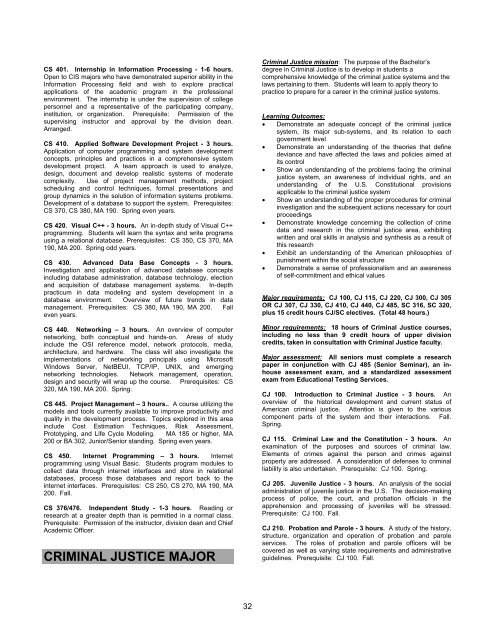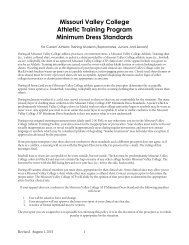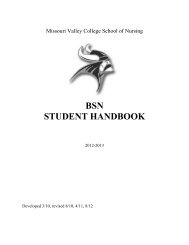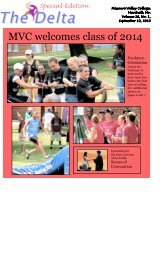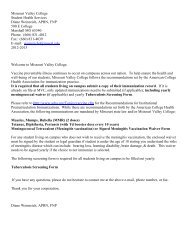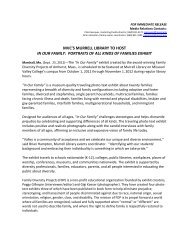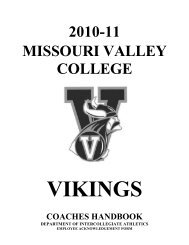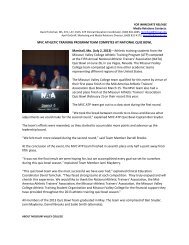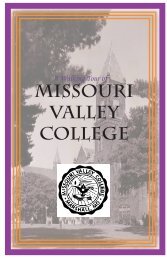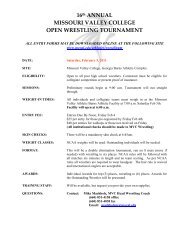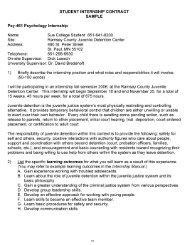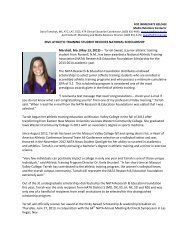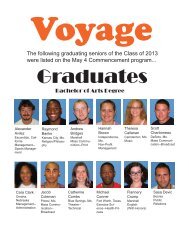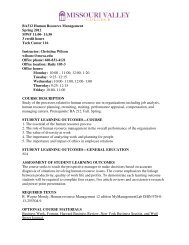2012-13 Undergraduate Catalog - Missouri Valley College
2012-13 Undergraduate Catalog - Missouri Valley College
2012-13 Undergraduate Catalog - Missouri Valley College
You also want an ePaper? Increase the reach of your titles
YUMPU automatically turns print PDFs into web optimized ePapers that Google loves.
CS 401. Internship in Information Processing - 1-6 hours.<br />
Open to CIS majors who have demonstrated superior ability in the<br />
Information Processing field and wish to explore practical<br />
applications of the academic program in the professional<br />
environment. The internship is under the supervision of college<br />
personnel and a representative of the participating company,<br />
institution, or organization. Prerequisite: Permission of the<br />
supervising instructor and approval by the division dean.<br />
Arranged.<br />
CS 410. Applied Software Development Project - 3 hours.<br />
Application of computer programming and system development<br />
concepts, principles and practices in a comprehensive system<br />
development project. A team approach is used to analyze,<br />
design, document and develop realistic systems of moderate<br />
complexity. Use of project management methods, project<br />
scheduling and control techniques, formal presentations and<br />
group dynamics in the solution of information systems problems.<br />
Development of a database to support the system. Prerequisites:<br />
CS 370, CS 380, MA 190. Spring even years.<br />
CS 420. Visual C++ - 3 hours. An in-depth study of Visual C++<br />
programming. Students will learn the syntax and write programs<br />
using a relational database. Prerequisites: CS 350, CS 370, MA<br />
190, MA 200. Spring odd years.<br />
CS 430. Advanced Data Base Concepts - 3 hours.<br />
Investigation and application of advanced database concepts<br />
including database administration, database technology, election<br />
and acquisition of database management systems. In-depth<br />
practicum in data modeling and system development in a<br />
database environment. Overview of future trends in data<br />
management. Prerequisites: CS 380, MA 190, MA 200. Fall<br />
even years.<br />
CS 440. Networking – 3 hours. An overview of computer<br />
networking, both conceptual and hands-on. Areas of study<br />
include the OSI reference model, network protocols, media,<br />
architecture, and hardware. The class will also investigate the<br />
implementations of networking principals using Microsoft<br />
Windows Server, NetBEUI, TCP/IP, UNIX, and emerging<br />
networking technologies. Network management, operation,<br />
design and security will wrap up the course. Prerequisites: CS<br />
320, MA 190, MA 200. Spring.<br />
CS 445. Project Management – 3 hours.. A course utilizing the<br />
models and tools currently available to improve productivity and<br />
quality in the development process. Topics explored in this area<br />
include Cost Estimation Techniques, Risk Assessment,<br />
Prototyping, and Life Cycle Modeling. MA 185 or higher, MA<br />
200 or BA 302, Junior/Senior standing. Spring even years.<br />
CS 450. Internet Programming – 3 hours. Internet<br />
programming using Visual Basic. Students program modules to<br />
collect data through internet interfaces and store in relational<br />
databases, process those databases and report back to the<br />
internet interfaces. Prerequisites: CS 250, CS 270, MA 190, MA<br />
200. Fall.<br />
CS 376/476. Independent Study - 1-3 hours. Reading or<br />
research at a greater depth than is permitted in a normal class.<br />
Prerequisite: Permission of the instructor, division dean and Chief<br />
Academic Officer.<br />
CRIMINAL JUSTICE MAJOR<br />
Criminal Justice mission: The purpose of the Bachelor’s<br />
degree in Criminal Justice is to develop in students a<br />
comprehensive knowledge of the criminal justice systems and the<br />
laws pertaining to them. Students will learn to apply theory to<br />
practice to prepare for a career in the criminal justice systems.<br />
Learning Outcomes:<br />
Demonstrate an adequate concept of the criminal justice<br />
system, its major sub-systems, and its relation to each<br />
government level<br />
Demonstrate an understanding of the theories that define<br />
deviance and have affected the laws and policies aimed at<br />
its control<br />
Show an understanding of the problems facing the criminal<br />
justice system, an awareness of individual rights, and an<br />
understanding of the U.S. Constitutional provisions<br />
applicable to the criminal justice system<br />
Show an understanding of the proper procedures for criminal<br />
investigation and the subsequent actions necessary for court<br />
proceedings<br />
Demonstrate knowledge concerning the collection of crime<br />
data and research in the criminal justice area, exhibiting<br />
written and oral skills in analysis and synthesis as a result of<br />
this research<br />
Exhibit an understanding of the American philosophies of<br />
punishment within the social structure<br />
Demonstrate a sense of professionalism and an awareness<br />
of self-commitment and ethical values<br />
Major requirements: CJ 100, CJ 115, CJ 220, CJ 300, CJ 305<br />
OR CJ 307, CJ 330, CJ 410, CJ 440, CJ 485, SC 316, SC 320,<br />
plus 15 credit hours CJ/SC electives. (Total 48 hours.)<br />
Minor requirements: 18 hours of Criminal Justice courses,<br />
including no less than 9 credit hours of upper division<br />
credits, taken in consultation with Criminal Justice faculty.<br />
Major assessment: All seniors must complete a research<br />
paper in conjunction with CJ 485 (Senior Seminar), an inhouse<br />
assessment exam, and a standardized assessment<br />
exam from Educational Testing Services.<br />
CJ 100. Introduction to Criminal Justice - 3 hours. An<br />
overview of the historical development and current status of<br />
American criminal justice. Attention is given to the various<br />
component parts of the system and their interactions. Fall.<br />
Spring.<br />
CJ 115. Criminal Law and the Constitution - 3 hours. An<br />
examination of the purposes and sources of criminal law.<br />
Elements of crimes against the person and crimes against<br />
property are addressed. A consideration of defenses to criminal<br />
liability is also undertaken. Prerequisite: CJ 100. Spring.<br />
CJ 205. Juvenile Justice - 3 hours. An analysis of the social<br />
administration of juvenile justice in the U.S. The decision-making<br />
process of police, the court, and probation officials in the<br />
apprehension and processing of juveniles will be stressed.<br />
Prerequisite: CJ 100. Fall.<br />
CJ 210. Probation and Parole - 3 hours. A study of the history,<br />
structure, organization and operation of probation and parole<br />
services. The roles of probation and parole officers will be<br />
covered as well as varying state requirements and administrative<br />
guidelines. Prerequisite: CJ 100. Fall.<br />
32


